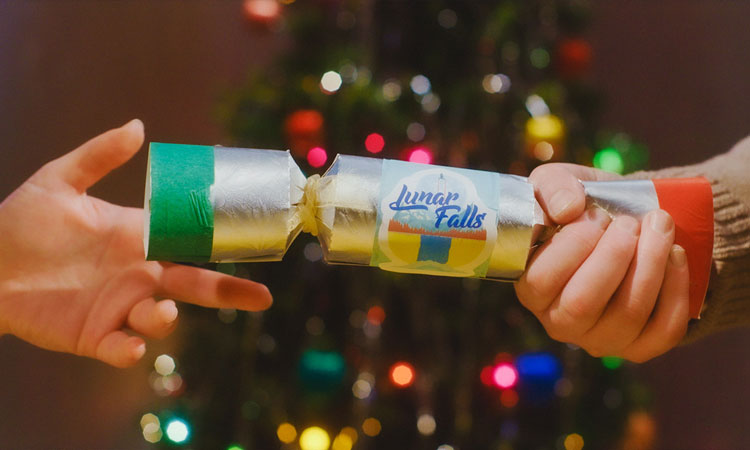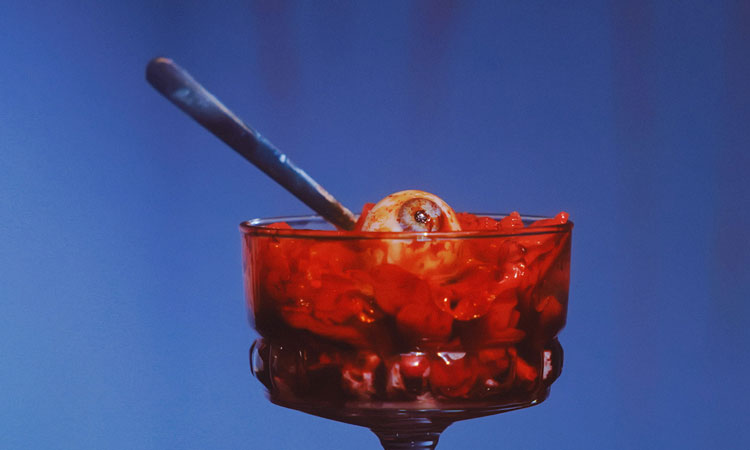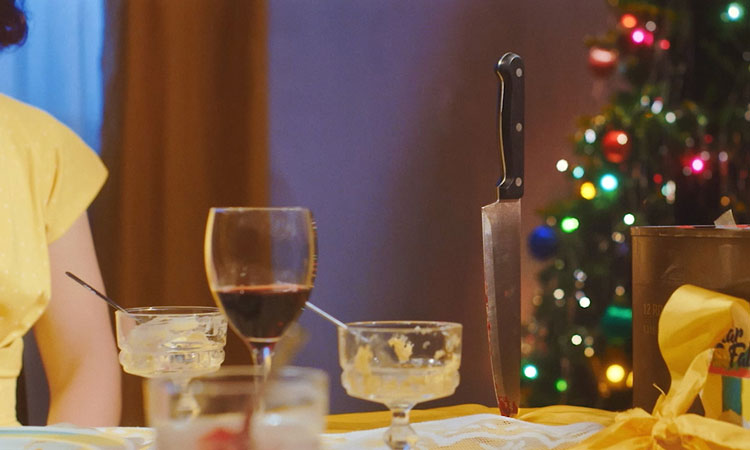Described as ‘the world’s first cinematic advent calendar’ Deathcember is an anthology advent that includes 24 terrifying short films by directors from around the globe. Turning the season of love into a season of fear, Deathcember promises gifts of blood and terror to unwrap for audiences everywhere.
Conceived and produced in Germany by Dominic Saxl, Ivo Scheloske and Frank Vogt, Deathcember gives audiences 24 bite-sized festive horror stories for each day leading up to Christmas.
For the project, 24 international directors were given five minutes and a €5000 budget to produce their entries. We spoke to British director, John Cook Lynch, about his segment: ‘Cracker’.

How did you get involved with Deathcember?
I met producers Dom and Ivo at a German Film Festival back in 2017. After seeing my short Eddie they approached me and told me about their idea to make an advent calendar of Christmas horror shorts funded by the German film board. To be honest it sounded like a bit of a crazy plan at first, but I was intrigued and over the course of the next 18 months I kept in touch sending a treatment and then a script and then one day they called and said: “Do you want to make a film?”
Can you tell us more about what Deathcember is about?
Deathcember is the world’s first cinematic advent calendar. It’s an anthology of 24 Christmas horror shorts one for every day leading up to the big day itself. In fact there are also a couple of bonus films for good measure in the credits. Each film is around 5 minutes and they have been produced by a diverse range of international directors. Some of them are pretty well known such as Ruggero Deodato (Cannibal Holocaust), Lucky McKee (May, The Woman) and Isaac Ezban (Parallel), then there are some lesser-known, up-and-coming directors… like me!
Can you tell us about your story, ‘Cracker’?
My film centres around a family partaking in the quintessential British festive pastime of pulling Christmas crackers. But as the film progresses it becomes clear there is a dark and sinister subtext to the game which builds (without giving anything away) to an outrageous climax. Oh, also did I mention that it’s all set in the Fifties and there’s even a sci-fi element?
If any, what were your inspirations when making ‘Cracker’?
The foremost influences for the story behind Cracker are serials of the Fifties and Sixties like The Twilight Zone and The Outer Limits. The atmosphere and editing is 100% homage to Alfred Hitchcock. There’s also a reference to much more modern horror in there but I can’t give that away as it would spoil the surprise.

What are the key themes and takeaways in ‘Cracker’?
Like my previous films, ‘Cracker’ centres around jet-black comedy and an attempt to make the mundane into something mysterious and suspenseful. Every British person knows how disappointing Christmas crackers generally are, so I wanted to elevate them into something way more exciting. There’s also a slightly ‘meta’ element going on with the film. I knew from the off that it was going to be part of a bigger anthology and so we played with that idea and tried to use the fact that audiences are expecting a certain type of film and play with those expectations to build tension. Again I don’t want to give anything away, but like my previous film, the true horror in ‘Cracker’ is something a bit more subtle than initially hinted, specifically to do with human nature, designed to stay with you after the film as you think more on it.
‘Cracker’ employs some great Fifties sitcom aesthetics – were there any particular sitcoms you looked to when creating the visuals for the film?
For the look of the film, we were very specifically going for Douglas Sirk’s style of 1950s melodrama. In a visual sense, his films aren’t that far away from horror films in a lot of respects. The subject matter may be different but just like a good horror film, Sirk employed heavy use of dramatic lighting, colours and pathetic fallacy to show the inner turmoil of his characters.

What was the most challenging aspect when sticking to the €5000 budget?
Haha! Everything. I felt extremely lucky to get a budget of any sort as well as 100% creative freedom, that’s a truly rare experience. Having said that though, creating a 1950s melodrama in a studio in London on that budget was tough. It doesn’t help that nearly half of the budget went on a single moment that I won’t give away but you’ll know what I mean if you’ve seen it!
The main way I got around budget constraints was by doing as many of the most arduous time-consuming tasks myself. As a result I did the costumes and the set design mostly by myself, a small team of us built the set and painstakingly wallpapered the flats the day before the shoot. Half the furniture in the film is my own. My wife did most of the crew catering. We had a pretty small crew but everyone did an exceptional job and I super proud of what we achieved.
Apart from your own, do you have a favourite story in Deathcember?
I think the beauty of Deathcember is there’s something in the film for everyone, and if a film isn’t your cup to tea, you move immediately onto to another new completely different story. In amongst the shorts, we have slashers, body horror, animation, social commentary, Giallo, queer horror even a full-blown action film!
There are a few of the other shorts that I personally really liked though. Isaac Ezban’s segment ‘Villancicos’ is a blackly comic and twisted short about a terminally ill kid that can only be kept alive by live carol singers. Lucky McKee’s ‘They Once Had Horses’ is a black and white western which may not be the most Christmassy film but the atmosphere and writing is just perfect. Steve De Roover’s ‘Family Matters’ is a Belgian body horror that for me has some of the best tension in the whole anthology. Fellow Brit, Bob Pipe, made a gorgeous homage to silent Twenties German Expressionist horror and finally, Annika Marx made one of the bonus segments ‘Christmas Corp.se’ which is a really accomplished J-horror style story.
There are many so-called ‘darker’ genre films set during the holiday season, why do you think that is?
I think the truth of the matter is that the dark parts of people’s lives don’t go away just because it’s the holidays (especially this year). I think at Christmas there is a tendency for people to just suppress their anxiety and fears with a handful of shiny tinsel and jolly music but it’s just a facade. I think the irony and contradiction of that facade is what makes such delicious pickings for filmmakers like me that seek to explore the darker side of life.
Horror films have always been about exploring fear in a safe cathartic way and I think that catharsis is even more important at a time of year when you’re bombarded with images and expectations of people having a wonderful, perfect Christmas.
What’s next for you?
Having made a couple of shorts I really want to make a push to get my first feature film made now. 2020 obviously put a hold on a lot of plans, but I’m going to sit down and do what I’ve always done, find a way to produce something where other people would understandably give up! If there are any more German producers with film board money out there, all monetary support is gladly accepted!
Deathcember is available now on iTunes
